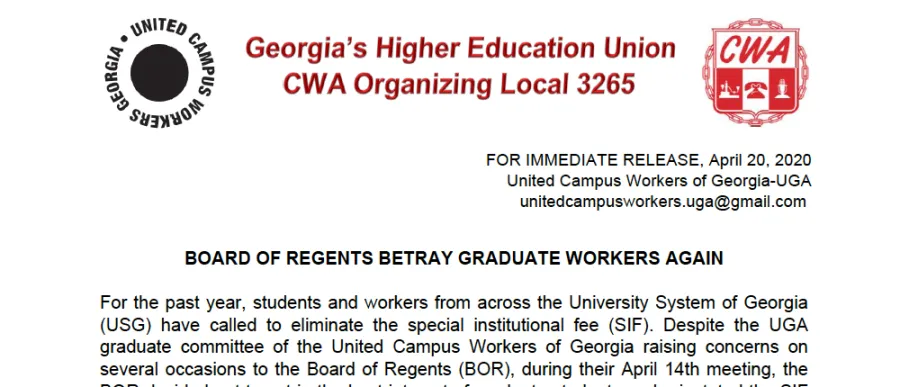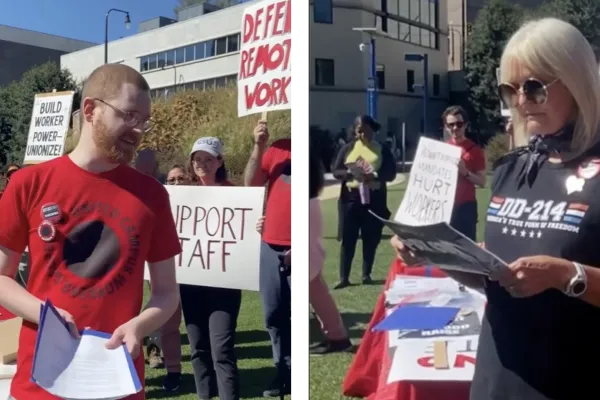News
UCWGA-UGA Press Release April 20th, 2020

Board of Regents Betrays Graduate Workers Again
"For the past year, students and workers from across the University System of Georgia (USG) have called to eliminate the special institutional fee (SIF). Despite the UGA graduate committee of the United Campus Workers of Georgia raising concerns on several occasions to the Board of Regents (BOR), during their April 14th meeting, the BOR decided not to act in the best interest of graduate students and reinstated the SIF for the 2020-21 school year.
Graduate employees are essential to UGA’s academic standard of excellence. Graduate workers contribute to groundbreaking research, maintain UGA’s excellent instructional standards, and provide personalized education and mentorship for undergraduates. Despite the value graduate students add to higher education, these workers often struggle to make ends meet when it comes to paying basic bills including student debt, child-care, housing, and healthcare. UGA’s establishment of a Graduate Student Emergency Fund, and the subsequent need to triple it, attests to the financial precarity of graduate students. The Graduate Student Emergency Fund addresses the symptoms, but not the cause of the problem—inadequate stipends and high student fees.
UGA graduate students can pay $3,168 a year in fees, the fourth highest fees among comparative universities in the nation. At $450 per semester, the SIF is not only the most onerous, but also the most unjust fee. Unlike the Technology and Green Fee, the SIF does not pay for a service for graduate students. The SIF reportedly subsidizes graduate student health insurance and funds graduate student stipends. Essentially graduate students are subsidizing a health insurance subsidy that is supposed to offer them financial relief. Furthermore, graduate students who obtain their health insurance elsewhere would be paying to subsidize other students’ health insurance. Finally, and most egregious, since a portion of this fee goes to funding graduate student teaching assistantships, graduate students are effectively paying themselves to work for the university.
Even though thousands of USG workers conveyed these concerns repeatedly in the form of letters, petitions, resolutions, and rallies, the BOR disappointed graduate students around the state by reinstating the SIF at its most recent meeting. Graduate students requested to speak during the meeting but were denied, and the BOR voted to maintain the SIF within twenty five minutes and with no public input.
While the implementation of the SIF lacks transparency, the BOR’s message to graduate workers is clear: our financial struggles do not matter to them. The BOR chose to waive only $22 worth of summer student fees in response to COVID-19, but not the SIF. USG leadership fails to recognize that COVID-19 did not create, but only exacerbated, the financial precarity of graduate workers. While the BOR’s decision is disappointing, the United Campus Workers of Georgia at UGA will continue to fight for a fair workplace and the repeal of the SIF."
View the PDF of the Graduate Committee's April 20th, 2020 press release:
"For the past year, students and workers from across the University System of Georgia (USG) have called to eliminate the special institutional fee (SIF). Despite the UGA graduate committee of the United Campus Workers of Georgia raising concerns on several occasions to the Board of Regents (BOR), during their April 14th meeting, the BOR decided not to act in the best interest of graduate students and reinstated the SIF for the 2020-21 school year.
Graduate employees are essential to UGA’s academic standard of excellence. Graduate workers contribute to groundbreaking research, maintain UGA’s excellent instructional standards, and provide personalized education and mentorship for undergraduates. Despite the value graduate students add to higher education, these workers often struggle to make ends meet when it comes to paying basic bills including student debt, child-care, housing, and healthcare. UGA’s establishment of a Graduate Student Emergency Fund, and the subsequent need to triple it, attests to the financial precarity of graduate students. The Graduate Student Emergency Fund addresses the symptoms, but not the cause of the problem—inadequate stipends and high student fees.
UGA graduate students can pay $3,168 a year in fees, the fourth highest fees among comparative universities in the nation. At $450 per semester, the SIF is not only the most onerous, but also the most unjust fee. Unlike the Technology and Green Fee, the SIF does not pay for a service for graduate students. The SIF reportedly subsidizes graduate student health insurance and funds graduate student stipends. Essentially graduate students are subsidizing a health insurance subsidy that is supposed to offer them financial relief. Furthermore, graduate students who obtain their health insurance elsewhere would be paying to subsidize other students’ health insurance. Finally, and most egregious, since a portion of this fee goes to funding graduate student teaching assistantships, graduate students are effectively paying themselves to work for the university.
Even though thousands of USG workers conveyed these concerns repeatedly in the form of letters, petitions, resolutions, and rallies, the BOR disappointed graduate students around the state by reinstating the SIF at its most recent meeting. Graduate students requested to speak during the meeting but were denied, and the BOR voted to maintain the SIF within twenty five minutes and with no public input.
While the implementation of the SIF lacks transparency, the BOR’s message to graduate workers is clear: our financial struggles do not matter to them. The BOR chose to waive only $22 worth of summer student fees in response to COVID-19, but not the SIF. USG leadership fails to recognize that COVID-19 did not create, but only exacerbated, the financial precarity of graduate workers. While the BOR’s decision is disappointing, the United Campus Workers of Georgia at UGA will continue to fight for a fair workplace and the repeal of the SIF."
View the PDF of the Graduate Committee's April 20th, 2020 press release:
Georgia public universities’ ‘return to office’ mandate may spark exodus
News
Georgia public universities’ ‘return to office’ mandate may spark exodus
Georgia public universities’ ‘return to office’ mandate may spark exodus
Get Involved: CWA Black History Month Town Hall
News
Get Involved: CWA Black History Month Town Hall
Get Involved: CWA Black History Month Town Hall
IUE-CWA Members at Mersen Protest Layoffs


